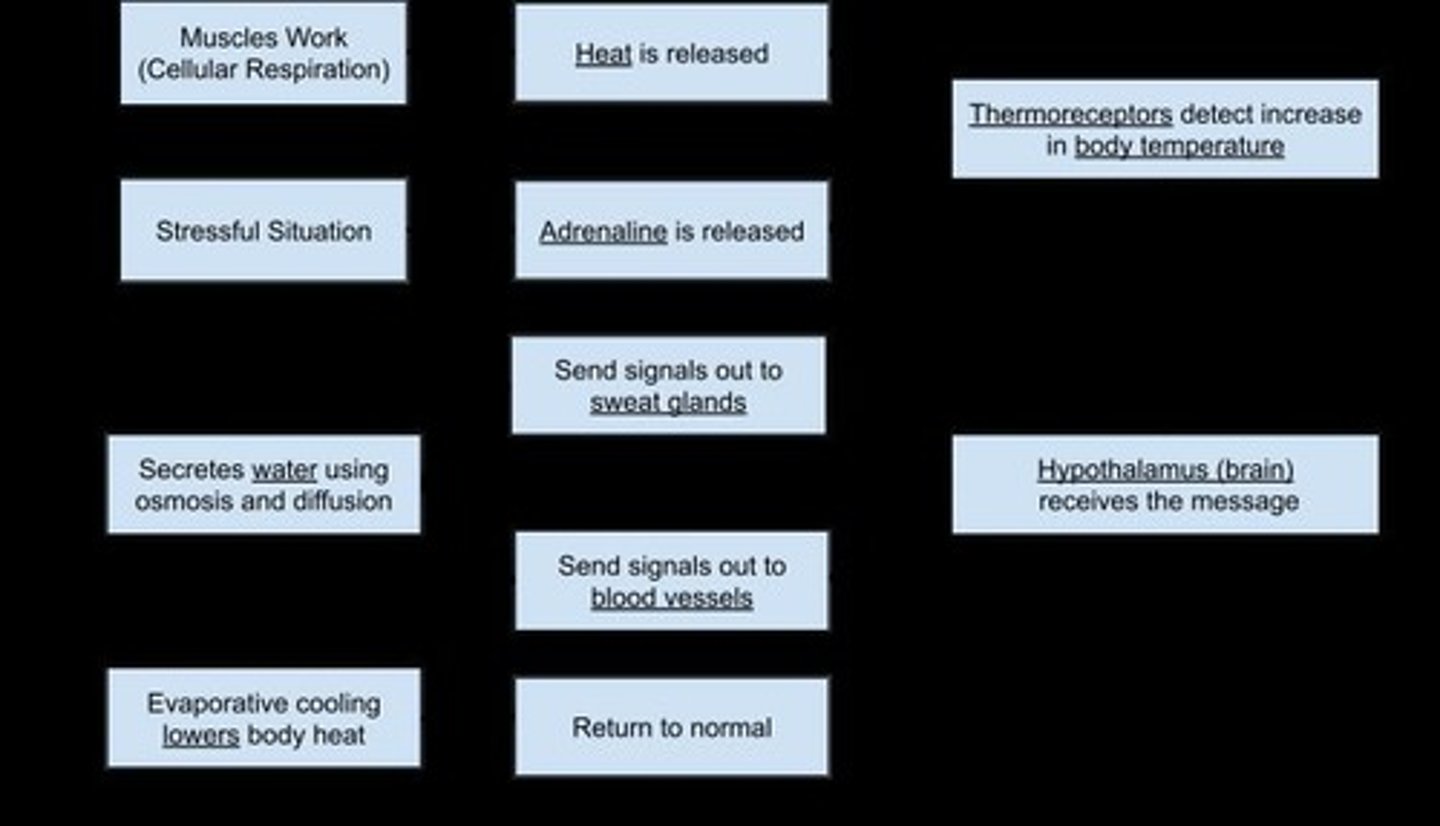Homeostasis and Feedback Loops in Biology
1/53
There's no tags or description
Looks like no tags are added yet.
Name | Mastery | Learn | Test | Matching | Spaced | Call with Kai |
|---|
No analytics yet
Send a link to your students to track their progress
54 Terms
Homeostasis
The ability to maintain a relatively stable internal state that persists despite changes in the world outside.

Response
Any behavior of a living organism that results from a stimulus or change.
Behavioral Response
A physical response related to motor neurons that may be conscious or unconscious.
Physiological Response
An unconscious response to stimuli that tends to be internal in the body.
Feedback Loop
Feedback systems that help maintain stability as internal conditions change.
Set Point
The 'normal' level in the body of a certain condition.
Stimulus
Something that causes a change in the body; results in imbalance away from normal.
Receptor / Sensor
A biological mechanism that senses a change in the body.
Control
A biological mechanism that receives information from a sensor and directs a response.
Effector
A muscle, gland, or organ that responds to a stimulus after receiving a message from the control.
Response / Effect
The action taken by the effector to return to set point.
Negative Feedback Loops
Work to oppose the original stimulus and bring back to normal.
Positive Feedback Loops
Work to enhance the original stimulus and set a new normal.
Independent Variable
Solution
Dependent Variable
Mass of Orbeez
Constants
Time for Orbeez to Sit, Amount of Solution, Number of Orbeez, Temperature of room
Hypothesis Format
IF (solution is changed somehow), THEN (mass will change in a specific way), BECAUSE (reasoning connected to scientific ideas)
Percent Change Formula
(Final - Initial / Initial) X 100
Control Solution
The solution used as a baseline for comparison in the experiment.
Distilled Water
A solution used in the experiment to observe the effects on Orbeez.
Salt Water
A solution used in the experiment to observe the effects on Orbeez.
Onion Cells
Cells observed in different solutions during the investigation.
Blood Cells
Cells observed in different solutions during the investigation.
Isotonic Solution
A solution where the concentration of solutes is equal inside and outside the cell.
Hypertonic Solution
A solution with a higher concentration of solutes compared to the cell, causing water to flow out.
Hypotonic Solution
A solution with a lower concentration of solutes compared to the cell, causing water to flow in.
Homeostasis
The process by which living organisms maintain a stable internal environment.
Membranes
Structures that separate the internal contents of a cell from its external environment.
Data Collection
The process of recording observations and measurements during the experiment.
Observations
Notes made about the appearance and behavior of cells in different solutions.
Brainstorming
The process of generating ideas and explanations based on observations.
Investigation 1
The first part of the experiment focusing on Orbeez and their mass changes.
Investigation 2
The second part of the experiment focusing on living cells in various solutions.
Experimental Procedure
The steps outlined to conduct the experiment and gather data.
Iso / Hypo / Hypertonic
(solution compared to cell)
Salt solution
(Iso/ Hypo / Hyper -tonic) compared to the cells.
Distilled water
(Iso/ Hypo / Hyper -tonic) compared to the cells.
Swelling
Occurs when cells are placed in a hypotonic solution.
Shrinking
Occurs when cells are placed in a hypertonic solution.
Secretion
Occurs to cells in an isotonic solution.
Absorption
Occurs to cells in a hypotonic solution.
Control Solution
Distilled Water (no solutes)
Mass stayed same
Indicates isotonic conditions.
Mass increased
Indicates hypotonic conditions.
Mass decreased
Indicates hypertonic conditions.
Water flows out of cell
Occurs when solute concentration is higher outside of cell.
Water flows in and out equally
Occurs when solute concentration is equal inside and outside of cell.
Water flows in cell
Occurs when solute concentration is higher inside cell.
Illustration of tonicity
Must include an image of a 'cell' and arrow showing direction of movement of water/solvent.
Evidence
What did you observe about the orbeez when they were in each solution?
Reasoning
Why would you expect to see the results you did?
CER table
Used to analyze data on the Orbeez from Investigation 1.
What I See
From our investigation.
What it Means
From our scientific discussion of solutions.